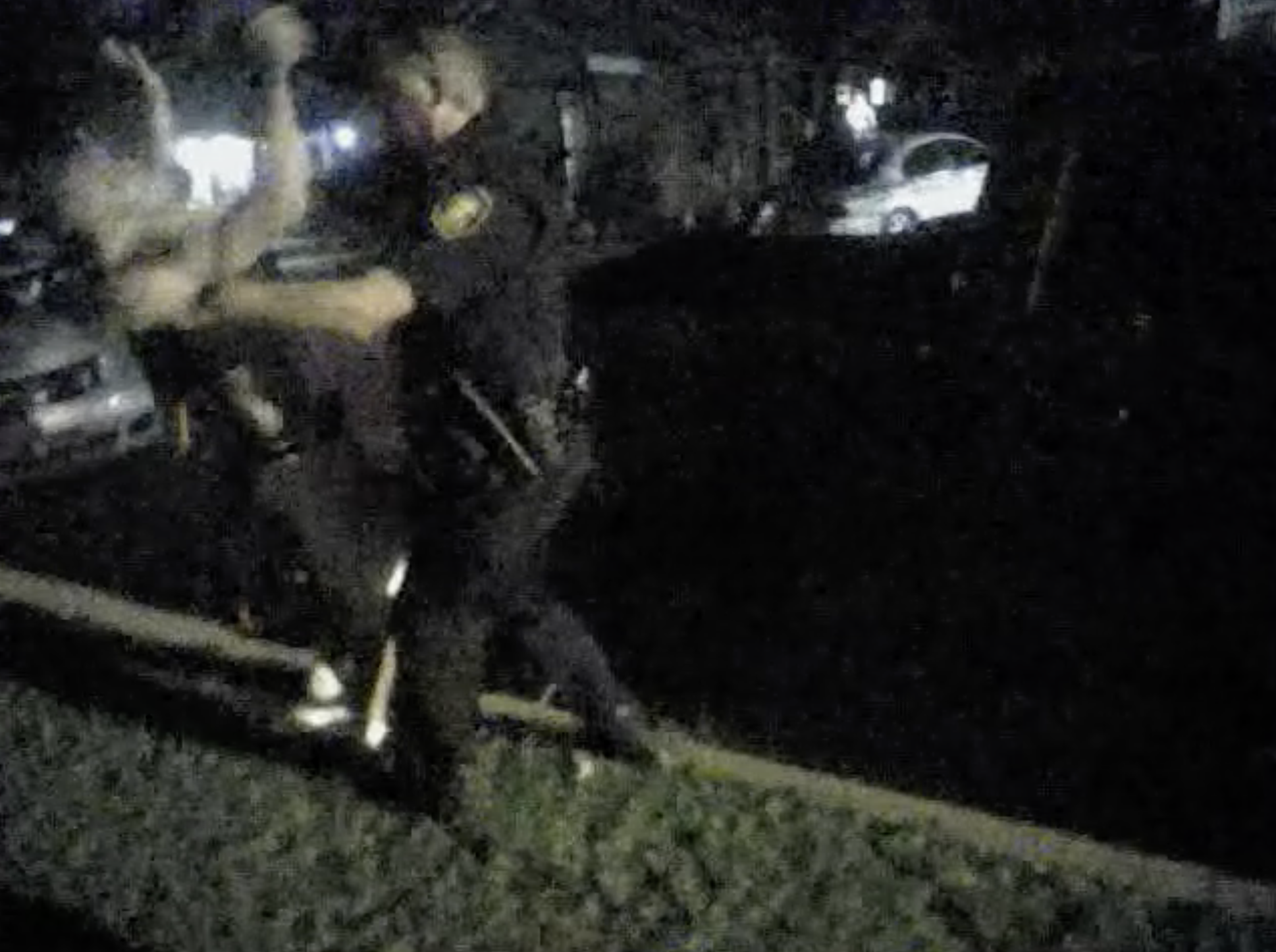
Fort Worth Police Department

Audio By Carbonatix
When Lynn Self heard her brother died in police custody in 2016, she didn’t think police or first responders were to blame. At least, she didn’t until she saw body camera footage from the day cops picked him up and noticed the discrepancies between what had been filmed and how the reports recounted the incident.
Scott Palmer and James Roberts, two of the family’s attorneys, say they see this all the time: contradictions between what appears in official reports and what’s captured on video.
Self’s brother Hirschell Wayne Fletcher Jr. was homeless and schizophrenic. He landed in Dallas police custody in December 2016. Fletcher had been robbed and assaulted outside a soup kitchen in Dallas, according to court documents, when someone else came by and punched him in the head. He fell and hit his head on a wall. Passersby told a nearby police officer, George Morales, who called two more cops to the scene along with two Dallas Fire-Rescue paramedics
If you read the paramedics’ report from that night, you’d think police took Fletcher away before they ever arrived on the scene. But that’s false.
When Self reviewed the body camera footage from that night, she saw DFR paramedics Brad Cox and Kyle Clark laughing at and harassing Fletcher while he lay in pain on the sidewalk for some 10 minutes. They assumed Fletcher was drunk, so he was charged with public intoxication and taken to the Dallas Marshal’s Office and City Detention Center. The next morning, Fletcher was rushed to the hospital after being found unresponsive in his cell. Fletcher died in the hospital from a head injury.
Cox and Clark had fudged their reports to entirely omit their interaction with Fletcher, but body camera footage reveals they ignored his pleas for help and gave the police the OK to take him.
Cox and Clark were later indicted in relation to the Fletcher case for tampering with government evidence. They falsified a report to cover up their failure to render aid. They pleaded guilty in 2019 and were sentenced to 12 months of probation and issued $500 fines.
Fletcher’s family filed a lawsuit against the city, the officers and the paramedics. They’re still duking it out in court.
Cox is at the center of another lawsuit stemming from an incident the same year he pleaded guilty to falsifying the Fletcher report. Video appears to show Cox kicking a detained man named Kyle Vess in the head while he sat on the ground.
One of the responding DPD officers mentioned the kick to her sergeant, which sparked a public integrity investigation. However, the kick was left out of the officer’s incident report from that day. Additionally, a DPD memo summarizing the public integrity investigation claims Vess was kicked in the upper torso, not the head.
Palmer and Roberts aren’t representing Vess in his lawsuit, but they say deviations from what’s caught on video and what ends up in official reports are nothing new to them.
The attorneys recently told the Observer that several of their cases show blatant lies by police. Cops wrote in their reports that arrests went down one way, but Palmer and Roberts say videos show otherwise.
In one of the cases, Dallas police officers claimed they were walking through a field in July 2018 when they stumbled upon Lee Yerena, who promptly informed them he was a felon. But Palmer and Roberts say body camera footage from the incident shows the arrest playing out differently.
They say video shows officers approaching a tent without knowing who’s inside and without giving any verbal commands. Then, DPD officer Jeffrey Newhouse shoots pepper spray into the tent. Yerena and his friend Jerry O’Neil were inside the tent and realized someone shot pepper spray inside. The two thought someone was preparing to rob them, so Yerena picked up a shotgun they had and pointed it outside the tent. When the cops saw the gun, they pulled out their weapons and commanded the two to exit the tent and get on the ground.
O’Neil tried running, but the officers caught him just a few yards away. Yerena was handcuffed and face-down on his stomach just outside the tent.
When the police later typed up their report, they never mentioned that they had used pepper spray.
Another case, in July 2017, involved a Fort Worth Police officer who punched their client Jose Vasquez in the face, breaking his nose.
FWPD officer Justin Landon wrote in his report that he had to use force because Vasquez wouldn’t show his hands. The video, however, clearly shows Vasquez had his hands up when Landon punched him in the face.
Vasquez filed suit in May 2018. Landon claimed qualified immunity, a somewhat controversial legal defense that keeps government employees and officials from being held liable for constitutional violations. It usually works, but only if the employees can prove they didn’t run afoul of “clearly established” law. After reviewing the body camera footage, the court denied Landon’s qualified immunity defense.
In its decision, the court said: “Officer Landon characterizes the strike of Vasquez as a ‘distractionary slap,’ and Officer Landon claims it was acceptable conduct given the situation. Upon viewing the video alongside the other summary judgment evidence, it is not clear to the Court that Officer Landon’s conduct constituted an appropriate ‘distractionary slap’ and was not an excessive use of force. Rather, the Court believes a jury needs to view this footage and other relevant evidence and live testimony to determine for themselves whether Vasquez’s constitutional rights were violated.”
Landon tried to appeal the decision, but the court denied it. Vasquez’s case is still working through the courts.
“This is happening constantly,” Roberts said, “and the way that we show it is through video that shows these officers are lying.”